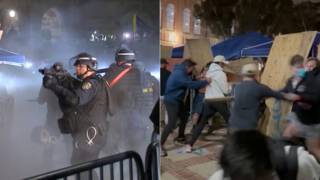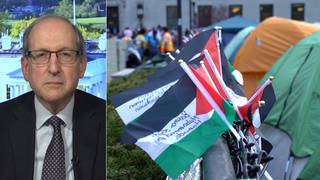
Related
Topics
Newly released documents show that Supreme Court nominee John Roberts argued strongly against strengthening the Act in 1982 when he served as an aide in Ronald Reagan’s Justice Department. We speak with the NAACP Legal Defense Fund about the history and future of voting rights. [includes rush transcript]
The 40th anniversary of the Voting Rights Act comes amid the recent release of memos written by Supreme Court Justice nominee John Roberts from his days as an aide in Ronald Reagan’s Justice Department. At the time, the House had overwhelmingly passed new provisions strengthening the Voting Rights Act. The memos reveal that Roberts strongly advocated a policy that would curtail the reach of the law. The policy would have barred only voting rules that intentionally discriminated as opposed to barring rules that have a discriminatory effect. This news is especially important as some key sections of the Voting Rights Act are set to expire in 2007.
- Debo Adegbile, Associate Director of Litigation for the NAACP Legal Defense Fund.
Transcript
AMY GOODMAN: The 40th anniversary of this act comes amid the recent release of memos written by Supreme Court Justice nominee John Roberts from his days as an aide in Ronald Reagan’s Justice Department. At the time the House had overwhelmingly passed new provisions strengthening the Voting Rights Act. The memos reveal that Roberts strongly advocated a policy that would curtail the reach of the law. The policy would have barred only voting rules that intentionally discriminated, as opposed to barring rules that have a discriminatory effect. This news is especially important as some key sections of the Voting Rights Act are set to expire in 2007. Here to talk with us more about the Voting Rights Act today is Debo Adegbile. He is the Associate Director of Litigation for the NAACP Legal Defense Fund. Welcome to Democracy Now!
DEBO ADEGBILE: It’s good to be with you.
AMY GOODMAN: It’s good to have you with us. Well, let’s start off on this issue of John Roberts’ record on this, what you’ve ascertained from the documents that have been released.
DEBO ADEGBILE: Well, it’s very clear that the issue that was being discussed in 1982 was not simply a matter of academic legal theory. It went to the centrality and the effectiveness of Section 2 of the Voting Rights Act, which is actually one of the Act’s permanent provisions. And the distinction between requiring proof of intentional discrimination or requiring proof based on results is a tremendous distinction, and ultimately the results test prevailed, and because of that, we have greater equality in the electoral process.
AMY GOODMAN: What do you assess from his documents, what exactly John Roberts has said in the pieces that are coming out now in The New York Times and others? The New York Times piece begins, “He produced a torrent of memorandums explaining why the Reagan administration was right to oppose new provisions in the Voting Rights Act that had just passed the House with an overwhelming majority. He drafted op-ed articles for his boss, Attorney General William French Smith, and he circulated talking points warning that Congress, by trying to make it easier to prove voting rights violations, was on the verge of creating a quota system for electoral politics. He scribbled angry notes on newspaper articles that showed an official from another department was veering off-message. It was 1981, John G. Roberts, Jr. was 26, two years out of Harvard Law School and an eager combatant in the political wars, including the one over the landmark 1965 Voting Rights Act up for renewal in Congress. In general, he wrote to one of his mentors after three months on the job, 'This is an exciting time at the Justice Department. So much has to be taken for granted for so long is being seriously reconsidered.'”
DEBO ADEGBILE: In 1982, it was a pitched battle over this issue. And the reason was because demonstrating intentional discrimination is very difficult. It often requires that you have a white federal judge make a finding that white officials, sometimes in the distant past, were intending to discriminate against minority citizens. And the proof is so difficult to assemble that it would have made Section 2 essentially a dead letter. And so, the civil rights community got organized and really fought hard to make sure that the discriminatory results test would prevail. And that test was imperative because if there is a system of government that results in discrimination, it should not stand. And that today is the law. John Roberts’ positions, though, consistent with the Reagan administration, do raise questions at this time about how he would interpret the Voting Rights Act as it sits today.
AMY GOODMAN: Now, this is very significant. It’s not just academic musings, is that right? Because if he goes on the court, the call for the renewal of the Voting Rights Act, this is over the next few years in 2007.
DEBO ADEGBILE: Absolutely. And let me make one distinction. The debate in 1982 was over Section 2, which is one of the permanent provisions of the act. What is before the legislature, before Congress in 2007, are a number of important provisions which are expiring unless Congress acts to renew them. But taken together, it’s very important either way, because certainly the Supreme Court will be in the position to interpret that permanent provision of the act, Section 2, as they will be the body that determines whether or not the renewed provisions survive Constitutional scrutiny.
AMY GOODMAN: Talk about the other provisions that you think are critical today.
DEBO ADEGBILE: Absolutely. The expiring provisions are the pre-clearance provision of the Voting Rights Act, Section 5. That provision requires certain jurisdictions with histories of entrenched discrimination to have all of their voting changes pre-approved by the federal government before they can take effect. And the concept is that this type of oversight, this type of shining the light on the electoral process, will serve to bring protections to minority voters, and it has been tremendously effective. There, also in play, will be Section 203, the language assistance provisions. As we look at the changes that the census have reflected, those provisions are integral to our contemporary democracy, and having voters be able to get ballots in their languages and have interpreters at the polls is critical. It’s critical in New York, it’s critical in Texas, it’s critical in places throughout the country. And finally are the federal observer provisions. Those provisions give the federal government the opportunity to send federal officials into jurisdictions that have been rumored to having electoral problems, and those observer provisions serve as a deterrent and also to collect evidence.
AMY GOODMAN: Talk about who is mounting the opposition to the renewal.
DEBO ADEGBILE: Well, although recent elections have sort of cloaked this issue, the Republican Party itself has different factions, and there are those who are doctrinaire and believe that no civil rights law, no affirmative remedy for minority voters should stand. Certainly Abigail Thernstrom with the U.S. Civil Rights Commission has been editorializing against the Voting Rights Act. There are a number of people, a number of electeds of both parties who have come out supporting the act, and it is indeed that fact that many Republicans are prepared to take leadership on this issue, not the least of which is James Sensenbrenner, who heads the very powerful House Judiciary Committee. The idea that there is actually an issue that both parties are supporting in this heated environment in D.C. is frustrating some more doctrinaire conservatives, but we are hopeful that the pragmatists and those who want to stand for democracy will prevail in the final analysis.
AMY GOODMAN: In the Washington Post piece that covered the march, they write, “Some conservatives have suggested parts of the law are no longer necessary, especially the section that requires nine states and parts of several others, mainly in the South, to seek federal approval for voting rights changes — voting rules changes. That section also mandates that states draw minority controlled Congressional districts if black and Hispanic voters dominate certain residential areas.”
DEBO ADEGBILE: That is going to be their tagline, but the evidence will not bear them out. It’s a preposterous claim. Taking Louisiana as an example, the State of Louisiana has had more objections under that pre-clearance provision under Section 5 since 1982 than it did between 1965 and 1982. That is the case through Democratic and Republican administrations. Moving to New York, just to show the breadth of the act, New York City and New York state has had every city council, state assembly, state senate and Congressional plan objected to by the Department of Justice for diluting minority votes in the 1980s and 1990s. Every single one in the 80s and 90s was turned back on the theory that minority votes would have been diluted in neighborhoods throughout the city. So the record will not bear that out. That was their slogan in 1965 when they opposed it. It will be their tagline again, but we are quite certain that we will be able to demonstrate that these protections remain important.
AMY GOODMAN: Can you talk about the lawsuit that Omali Yeshitela and others have just brought on Friday in St. Petersburg, Florida?
DEBO ADEGBILE: That lawsuit is an important one, and it is also an example of why it was so important for John Roberts’ view to not have prevailed in 1982. That lawsuit, under one of the permanent provisions, Section 2 of the Voting Rights Act, is designed to attack an at-large system of elections. At-large elections tend to submerge minority votes. In a winner-take-all majority-rule situation, if there are no districts to give effect to separate voices within a community, then minority votes are going to be submerged, where you have what we call racial bloc voting, the tendency of white voters to vote as a bloc to defeat minority interests. And that lawsuit is under the results test of Section 2, so all they will need to prove is that the at-large system in St. Petersburg has the result of discriminating against the city’s minority voters, and if they can make that proof, they prevail. Had John Roberts’ view of the world prevailed, they would have been required to show that the at-large system was intentionally designed to limit minority voters’ voices, and that, of course, for obvious reasons is a much higher threshold.
AMY GOODMAN: How does this apply to people in this country, people of color outside of African Americans, the Voting Rights Act?
DEBO ADEGBILE: Well, one good example is a move that the Justice Department itself had two weeks ago. The Justice Department itself in Osceola, Florida, filed a Section 2 lawsuit, alleging that Latino voters were having their votes submerged, again by the system that I’ve described, an at-large election system. And that was the federal government, this federal government, filing suit under the provision of Section 2 to give effect to the voices, to the Latino voices in Florida. Beyond Section 2, obviously the language assistance provisions are important, and if you were speaking to the Asian American Legal Defense Fund, they would tell you important stories about how the Section 5 pre-clearance provision has been used in New York City to require New York City to enforce the language assistance provisions. So what the Voting Rights Act is is an integrated minority protection system, and for that reason, all of the expiring provisions need to be renewed. And in the events in Atlanta, we saw people of all races and ethnicities coming together for the same purpose.
AMY GOODMAN: Well, I want to thank you very much for being with us. Debo Adegbile is Associate Director of Litigation at the NAACP Legal Defense Fund. Thank you.
DEBO ADEGBILE: Thank you very much.












Media Options